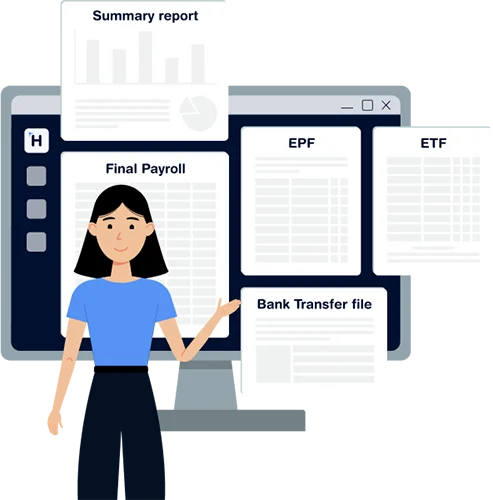There is no single workplace function more critical than time and attendance management, in keeping employee hours and days worked plus payroll in order, while directly contributing to cost savings and better productivity.
In Sri Lanka, the Shop and Office Employees Act 1954 is an important piece of legislation that both employer and employee rely on for efficient and fair regulation of an employee’s attendance and working hours.
Since its introduction in Sri Lanka, the various sections of the Act have enforced employee and employer rights including in the area of time and attendance, for e.g. with the deduction of employee salaries for being absent from work or attending late without offering a valid excuse.
Shop and Office Employees Act 1954 – Foundation of Time and Attendance Regulation in Sri Lanka
In Sri Lanka, time and attendance and all related activities involving employees are governed by the Shop and Office Employees Act 1954.
The Shop and Office Employees Act 1954 was introduced in 1954 to regulate employees, the working hours and salaries of employees working in shops and offices, and related matters.
The Act includes numerous sections applicable to different areas of time and attendance, and the main ones have been included below.
- According to s 18 of the Shop and Office Employees Act 1954, an employer can deduct salaries from employees if it complies with s 19(1)(a)(iii) of the Shop and Office Employees Act 1954 in terms of the provisions set down in s 18 of the Shop and Office Employees Act 1954.
- One such important and relevant provision to this topic on time and attendance is s 19 (7)(a) and s 19 (7)(b) of the Shop and Office Employees Act 1954 which states that an employer can deduct salaries of employees if they get absent from work and attend late to work respectively without a reasonable excuse.
- Based on s 3 (1)(a) of the Shop and Office Employees Act 1954, an employee cannot exceed working for more than 8 hours on any given day and based on s 3 (1)(b) of the Shop and Office Employees Act 1954, no employee can exceed more than 45 hours of work per week.
- S 18(b) of the Shop and Office Employees Act 1954 provides that in the premises of a shop or office there should be a record maintained in the required form and manner of the number of actual hours worked by each employee including overtime work, holidays and leave granted to or taken by each employee.
Time and attendance systems have evolved greatly since the inception of the Act, and today you’ll see Sri Lankan businesses adopting a range of both manual and digital time and attendance systems to suit their specific purpose.
In the global context, a study by QuickBooks — pioneers in accounting and payroll software plus services — revealed that 38% of US companies and 58% of Canadian companies still use manual systems such as punch cards and paper timesheets to track time. Even with growing digital time and attendance system adoption locally, the percentage of Sri Lankan small businesses using manual systems is bound to be higher than in the US and Canada.
Outdated, Manual Time and Attendance Systems: Errors, Risk of Time-Theft and Huge Losses
Using outdated time and attendance management systems like paper timesheets and punch cards lead to more errors in time and attendance recording. From the same source included above, it was also learned that 80% of the timesheets submitted by their employees required checking and correcting errors, because many employees were unable to remember their exact hours after forgetting to clock in or out.
Plus without a proper time and attendance system, companies are more at risk of employees changing time records and thereby experiencing time-theft and the like. According to the same Quickbooks statistics report, it was revealed that just in the US, time-theft costs employers in excess of $11 Billion each year!
It is clear that the direct and indirect cost of using poor time and attendance management systems is huge, justifying further the critical need for Sri Lankan businesses small and large to adopt time and attendance software in improving staff productivity and reducing loss.
Key Employer Benefits of Time and Attendance
From payroll, reducing absenteeism and high turnover, to boosting productivity, we explore below the main reasons for the critical business and administration value of time and attendance.
- Basic need of keeping track of the employees’ working hours and attendance
- Critical part of payroll including staff pay, leave and overtime
- Reduce payroll cost by accurately monitoring staff time and attendance
- Save time and improve productivity
- Reduce employee absenteeism and thereby new hire costs
- Ensure employee compliance with company regulations
- Avoid time-theft and other forms of deception
A Key Employee Benefit of a Proper Time and Attendance System: More Accurate Overtime Calculation
Apart from the increase in employee satisfaction through greater accuracy in calculating pay and lower human errors or miscalculations, a proper time and attendance system will also ensure staff receive the correct amount of overtime pay.
Calculating overtime in Sri Lankan companies is mandatory as it’s a way of compensating employees for their extra effort and time allocated in contributing to the business.
What Are Time and Attendance Systems?
Time and attendance systems are generally categorized into a few types:
- Manual: paper cards are used and need to be manually time stamped with the assistance of a time-stamping machine.
- Time card: the card has to be swiped on a machine, data is collected and automatically transferred to a computer-based timesheet
- Proximity-based: these involve proximity cards and badges including employee ID cards, which do not have to be swiped but passed in front of the reader
- Biometric: usually involve fingerprint readers or some sort of facial recognition software
- Web app-based: internet-based geolocation or facial recognition system
What’s interesting is that more and more Sri Lankan companies, including small businesses are now adopting automated time and attendance systems.
And due to technological development, time and attendance systems now enable employees to clock in and out through online time clocks, mobiles and computers. The use of mobile phones and computers to clock in and out rose greatly during the pandemic when employees were forced to work from home and update their attendance remotely.
Whether across physical premises or remote working environments, managing time and attendance digitally is becoming more popular among Sri Lankan small businesses keen to improve productivity, reduce costs, lower time and attendance misuse, and enhance employee satisfaction.
Therefore, in part two of this article, we take a look at different time and attendance software available in Sri Lanka, so you can make an informed decision on which one best suits your company’s unique time and attendance requirements.

